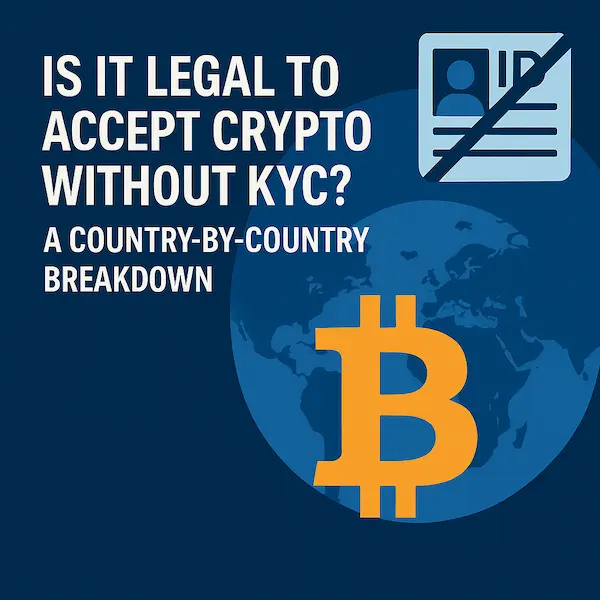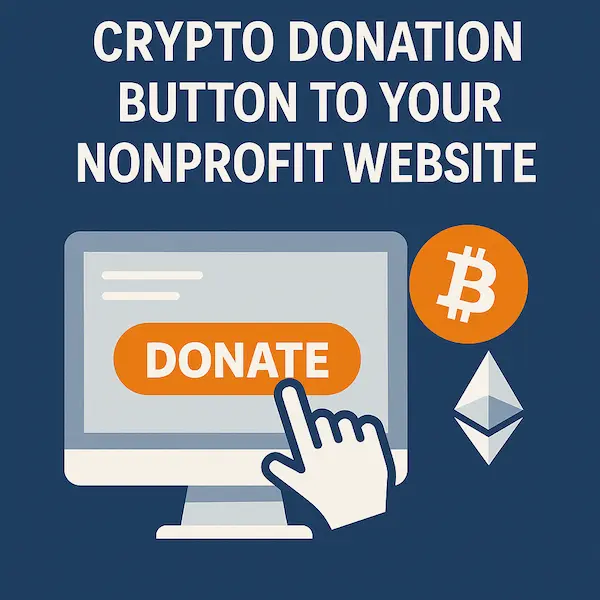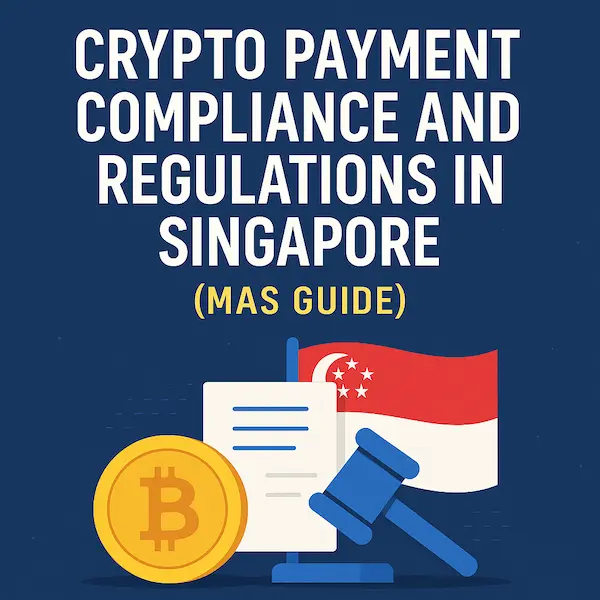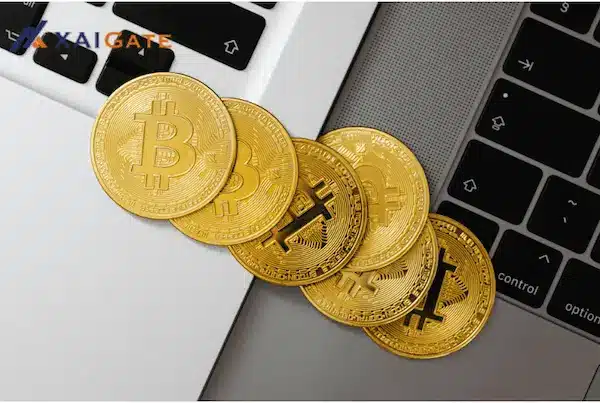In recent years, the debate around Accept Crypto Without KYC has become one of the most controversial topics in the digital finance world. KYC, or Know Your Customer, is a standard compliance process that requires users to provide identity documents before accessing financial services. While banks and most regulated exchanges have adopted KYC for decades, the crypto industry was born on the promise of anonymity and borderless transactions.
This clash between regulation and decentralization has left both businesses and individuals questioning: Is it still possible to accept crypto without KYC in 2026? Some countries are embracing flexible rules to encourage blockchain adoption, while others are tightening restrictions under anti-money laundering (AML) frameworks.
In this article, we provide a country-by-country breakdown of where it may still be legal to operate without strict KYC checks, where the law is unambiguous, and the risks merchants must consider before integrating no-KYC solutions.
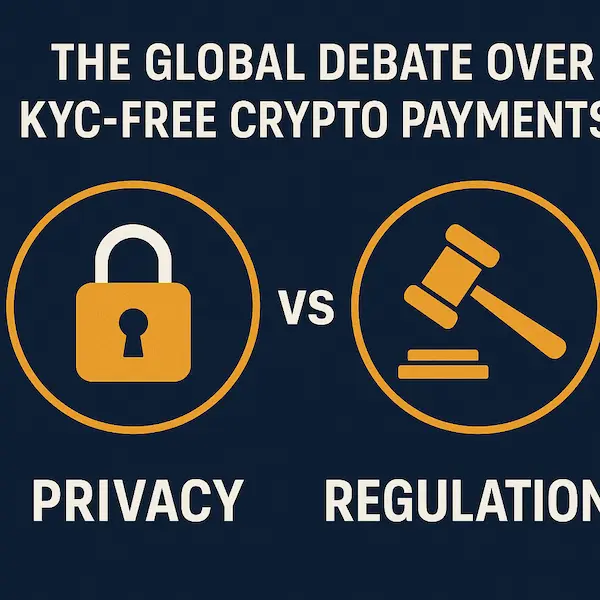
Contents
- 1 1. Why KYC Matters in the Crypto Industry
- 2 2. Countries Where You Can Accept Crypto Without KYC (2026 Update)
- 3 3. Countries with Strict KYC Requirements
- 4 4. Legal Risks of Accepting Crypto Without KYC
- 5 5. Steps to Legally Accept Crypto Without KYC
- 6 6. Future of KYC-Free Crypto Transactions (2026–2030)
- 7 FAQs – Accept Crypto Without KYC
- 8 Conclusion: The Future of Accepting Crypto Without KYC
1. Why KYC Matters in the Crypto Industry
KYC, short for Know Your Customer, is not just a bureaucratic requirement. It is the backbone of how governments and regulators monitor financial systems. By collecting identity documents and verifying users, platforms reduce the risks of money laundering, tax evasion, and even terrorist financing. For traditional banks, KYC has been mandatory for decades.
In crypto, however, the story is different. Many early adopters valued anonymity as one of the main attractions of blockchain transactions. For them, being able to accept crypto without KYC was not only about convenience, but also about preserving privacy in a digital economy that increasingly tracks user behavior.
Still, regulators argue that without proper KYC, the risks multiply. Criminal networks may use no-KYC platforms to move funds quickly across borders. Consumers are also exposed to higher risks of scams, as unverified wallets make it harder to trace fraud.
To highlight the tension, consider this quick comparison:
| Factor | With KYC | Accept Crypto Without KYC |
|---|---|---|
| Compliance with law | Strong | Weak / Risky |
| Transaction speed | Slower | Faster |
| User privacy | Limited | High |
| Risk of fraud | Lower | Higher |
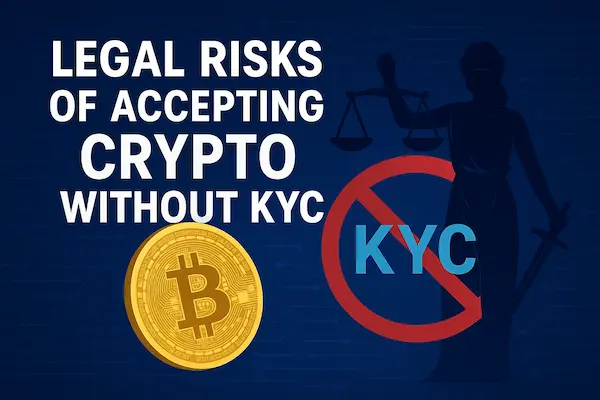
2. Countries Where You Can Accept Crypto Without KYC (2026 Update)
Not every jurisdiction treats crypto the same way. While the majority of financial regulators demand strict compliance, a handful of countries remain more flexible. In these regions, merchants and platforms may still accept crypto without KYC, especially for smaller transactions or within experimental frameworks.
1. El Salvador
El Salvador made global headlines in 2021 by declaring Bitcoin legal tender. The government encourages adoption and, in practice, small-scale payments often do not require identity verification. Street vendors, cafés, and small merchants can accept crypto without KYC for day-to-day use, as long as the amounts remain low. However, larger transactions still attract the attention of regulators and banks.
2. United Arab Emirates (Dubai & Abu Dhabi)
The UAE has positioned itself as a global crypto hub. Regulators in Dubai and Abu Dhabi operate “regulatory sandboxes” that allow startups to test crypto payment solutions. Within these frameworks, companies can run pilot projects that may temporarily accept crypto without KYC, particularly for research and market testing. While the UAE still maintains clear AML standards, it has shown more flexibility than Europe or the U.S.
3. Nigeria
Nigeria’s economy has one of the highest rates of crypto adoption in the world, largely driven by peer-to-peer (P2P) trading. Although the Central Bank introduced restrictions on banks handling crypto, enforcement is inconsistent. In practice, millions of Nigerians accept crypto without KYC through P2P platforms, often relying on trust networks rather than formal identity checks.
4. Venezuela
Due to hyperinflation and sanctions, Venezuelans have turned to crypto as an alternative means of payment. While the government has attempted to regulate exchanges, enforcement remains weak. Many local businesses and individuals still accept crypto without KYC, often using USDT for stability. This has turned Venezuela into one of the most active no-KYC crypto markets globally.
Country-by-Country Comparison Table
To help merchants and developers quickly assess where it may still be possible to accept crypto without KYC, here is a side-by-side comparison of major markets in 2026:
| Country | KYC-Free Allowed? | Regulatory Note | Risk Level |
|---|---|---|---|
| El Salvador | Yes (small txns) | Bitcoin is legal tender; low-value transactions may not require KYC. | Low |
| United States | No | SEC & FinCEN mandate full KYC for exchanges and merchants. | High |
| European Union | No | MiCA regulation enforces strict AML/KYC compliance. | High |
| Nigeria | Partial | Strong peer-to-peer market allows many no-KYC trades. | Medium |
| Vietnam | Grey Zone | No official crypto law; small merchants sometimes accept payments without KYC. | Medium |
| UAE (Dubai, Abu Dhabi) | Partial | Regulatory sandboxes allow limited KYC flexibility. | Low |
| Japan | No | One of the strictest frameworks; full KYC required. | High |
| Turkey | Grey Zone | Payments banned but enforcement inconsistent; some sectors still use crypto without KYC. | Medium |
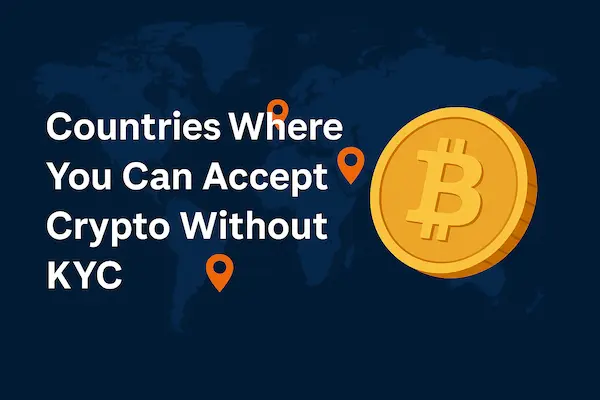
3. Countries with Strict KYC Requirements
While some regions remain flexible, most major economies have taken a hard stance. In these countries, trying to accept crypto without KYC is almost impossible for merchants and platforms, as regulators impose full compliance with identity verification rules.
1. United States
The U.S. is one of the strictest markets when it comes to crypto compliance. Agencies like the SEC (Securities and Exchange Commission) and FinCEN (Financial Crimes Enforcement Network) require all crypto exchanges and payment processors to conduct full KYC. Any attempt to accept crypto without KYC is considered a violation of anti-money laundering (AML) laws. Recent enforcement actions have resulted in billion-dollar penalties for companies that failed to follow KYC rules.
2. European Union
The EU’s MiCA regulation (Markets in Crypto-Assets), coming into full force between 2024 and 2026, establishes a unified framework for all member states. Under MiCA, KYC is mandatory for exchanges, wallets, and payment gateways. Merchants who try to accept crypto without KYC face severe penalties and risk losing access to the European financial system. The EU is setting the global standard for strict compliance.
3. Singapore
Known as a fintech hub, Singapore balances innovation with control. The Monetary Authority of Singapore (MAS) has granted licenses to crypto companies but requires full AML/KYC procedures. For businesses, this means it is not legally possible to accept crypto without KYC in Singapore. However, the government’s clear framework has also made it one of the safest places for crypto adoption.
4. Japan
Japan was among the first countries to regulate crypto after the Mt. Gox collapse. Today, all licensed exchanges and crypto payment processors must follow strict KYC requirements. Merchants cannot accept crypto without KYC, even for small transactions. This rigid framework has given Japan a reputation as one of the most secure but heavily regulated crypto markets in the world.
4. Legal Risks of Accepting Crypto Without KYC
While the idea of anonymity and speed is attractive, merchants and platforms that try to accept crypto without KYC face significant risks. These risks are not just financial but also legal and reputational.
Regulatory Penalties
In countries with strict compliance rules, operating a business that accepts crypto without verifying customer identity can lead to fines, license suspension, or even criminal charges. For example, in the U.S., several exchanges faced billion-dollar penalties after regulators discovered weak or absent KYC systems.
Restricted Access to Banking
Banks and payment providers are often reluctant to work with businesses that accept crypto without KYC, fearing regulatory backlash. This lack of access to the traditional financial system makes it harder for merchants to convert crypto into fiat or expand internationally.
Risk of Fraud and Money Laundering
When merchants accept crypto without KYC, they open the door to higher risks of scams, chargeback-like disputes, and illicit transactions. Criminal groups may exploit these loopholes to launder money across borders. If a merchant is linked to such activity, even unintentionally, the reputational damage can be severe.
International Expansion Challenges
Businesses planning to scale into markets like the EU, Singapore, or Japan will face roadblocks if they build their model around no-KYC crypto payments. Without compliance, they cannot obtain the necessary licenses or banking relationships to operate legally.
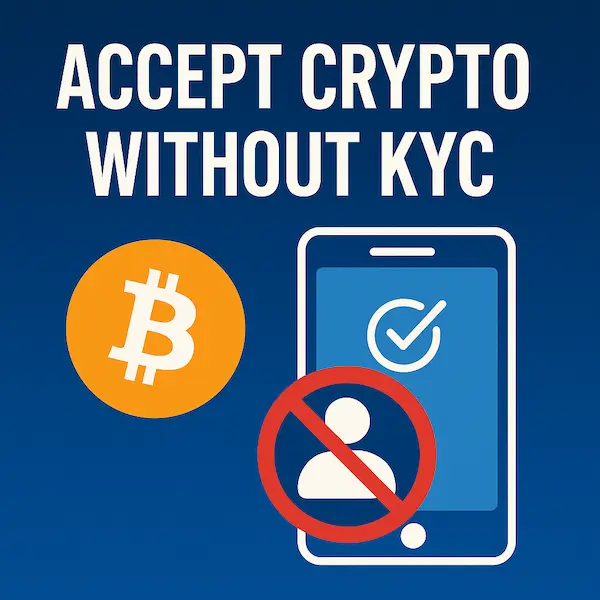
5. Steps to Legally Accept Crypto Without KYC
For merchants and developers, the big question is: if you want to accept crypto without KYC, what can you do to stay within legal limits? While the rules vary by jurisdiction, there are practical steps to reduce risk.
1. Check Local Regulations First
Before integrating any payment gateway, research national laws. Some countries clearly prohibit merchants from accepting crypto without KYC, while others allow low-value transactions without verification. Staying updated with regulations is essential.
2. Use Tiered KYC Approaches
In certain regions, regulators tolerate tiered KYC systems. This means small transactions can go through without full identity checks, but higher-value payments require stricter verification. By designing your system this way, you may still legally accept crypto without KYC at a limited scale.
3. Partner with Compliant Gateways
Instead of building your own system, work with established providers such as XaiGate, BitPay, or NOWPayments. Many of these platforms offer customizable compliance layers, enabling merchants to process transactions efficiently while still meeting basic AML standards.
4. Maintain Transparent Reporting
Even if you manage to accept crypto without KYC for small payments, you should always keep accurate transaction records. Reporting income to tax authorities, such as the IRS in the U.S. or the IRAS in Singapore, helps reduce legal risks and builds trust with partners.
5. Monitor Global Trends
Crypto law evolves quickly. A country that allows KYC-free payments today may introduce strict rules tomorrow. Businesses that want to grow internationally should keep an eye on regulatory updates in markets like the U.S., EU, and Asia.
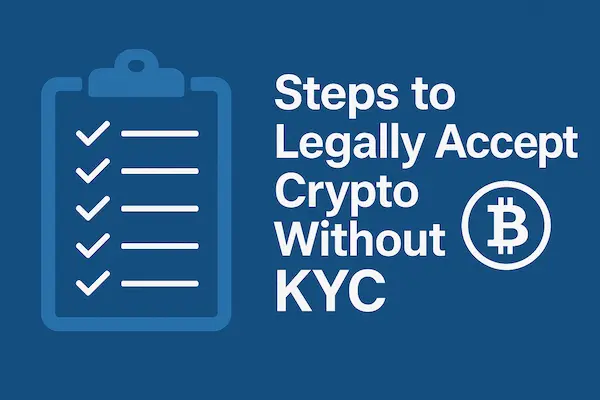
6. Future of KYC-Free Crypto Transactions (2026–2030)
The next five years will be critical for determining whether merchants can still accept crypto without KYC. Regulatory bodies worldwide are moving toward greater harmonization, meaning the legal room for anonymous transactions is shrinking.
Global Regulatory Push
The Financial Action Task Force (FATF) has been pressuring countries to adopt the “Travel Rule,” which requires exchanges and payment providers to share customer data across borders. By 2030, most major economies are expected to fully enforce this rule, making it increasingly difficult for businesses to accept crypto without KYC.
Rise of MiCA and CBDCs
The European Union’s MiCA framework is already setting a global standard for crypto compliance. At the same time, the development of Central Bank Digital Currencies (CBDCs) in countries like China, India, and the EU suggests a future where state-backed digital money coexists with crypto. In such an environment, no-KYC payments will likely be confined to small, informal transactions.
Tiered KYC Models
A possible compromise is the adoption of tiered KYC systems. Under this model, low-value payments can be processed without full identity checks, while higher-value transactions require stricter verification. Some regulators are considering this approach as a way to balance innovation with security. For merchants, this could mean it remains possible to accept crypto without KYC for micro-payments, but not for larger business operations.
Role of DeFi and P2P
Decentralized finance (DeFi) and peer-to-peer (P2P) transactions will likely remain the last frontier for no-KYC crypto usage. As these systems operate without central intermediaries, enforcing KYC is technically challenging. However, even DeFi protocols are facing pressure to integrate compliance features, suggesting that the future of truly anonymous crypto transactions is uncertain.
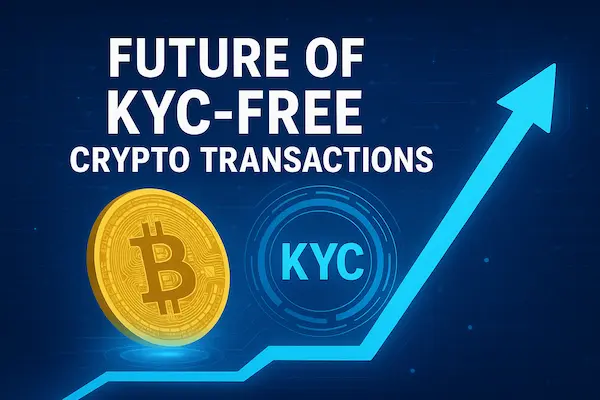
FAQs – Accept Crypto Without KYC
1. What does it mean to accept crypto without KYC?
It means processing crypto payments without verifying customer identity, offering privacy and speed but with higher risks.
2. Is it legal to accept crypto without KYC in the United States?
No. U.S. law requires strict KYC under SEC and FinCEN rules, making no-KYC crypto payments illegal.
3. Which countries allow merchants to accept crypto without KYC in 2026?
El Salvador, Nigeria, Venezuela, and the UAE still allow limited no-KYC crypto payments, mainly for small transactions.
4. What are the risks of accepting crypto without KYC for businesses?
Risks include regulatory fines, banking restrictions, fraud exposure, and reputational damage.
5. Why do regulators enforce KYC in the crypto industry?
KYC prevents money laundering, tax evasion, terrorism financing, and protects consumers from scams.
6. Can small merchants legally accept crypto without KYC?
In some regions with unclear rules, small merchants may do so, but legality is uncertain and risky.
7. How does accepting crypto without KYC differ from peer-to-peer trading?
P2P trading is between individuals, while merchant payments are business transactions under stricter regulation.
8. Will it still be possible to accept crypto without KYC by 2030?
Likely reduced under FATF and MiCA, though tiered KYC may allow small-value no-KYC payments.
9. Do decentralized platforms require users to complete KYC?
Most DeFi and P2P platforms do not require KYC today, but regulators are pushing for partial compliance.
10. What is the safest way for merchants to accept crypto without KYC today?
Keep it limited to small transactions, use stablecoins, partner with compliant gateways, and maintain clear records.
Conclusion: The Future of Accepting Crypto Without KYC
The debate over whether merchants can accept crypto without KYC is far from over. In 2026, the global map is divided: some countries embrace flexibility to drive adoption, while others enforce strict compliance to protect their financial systems. What is clear, however, is that the space for fully anonymous transactions is narrowing year by year.
International regulators, from the FATF Travel Rule to the EU’s MiCA framework, are tightening oversight. Even regions that once tolerated KYC-free crypto payments, like Nigeria and parts of the Middle East, are now building stronger compliance systems. Meanwhile, decentralized finance and peer-to-peer networks remain loopholes, but their long-term survival without KYC is uncertain.
For businesses, the message is simple: explore opportunities where they exist, but prepare for a future where compliance is no longer optional.
Quick Summary Table
| Key Point | Insight (2026) |
|---|---|
| Legal Status | Only a few countries (e.g., El Salvador, Nigeria) allow limited no-KYC crypto use. |
| Risks | Heavy fines, banking restrictions, reputational damage. |
| Global Trend | Moving toward stricter compliance (FATF, MiCA, CBDCs). |
| Future Outlook | Tiered KYC models may allow small no-KYC payments, but large-scale use will decline. |
If you are a merchant, developer, or entrepreneur exploring crypto payments, now is the time to act wisely. The opportunity to accept crypto without KYC still exists in certain markets, but regulations are shifting fast.
Instead of risking penalties, partner with trusted providers like XaiGate, which offers low-fee, stablecoin-focused payment gateways designed to balance user privacy with global compliance. By choosing the right strategy today, you can stay ahead of regulations, build customer trust, and future-proof your business.
We may also be found on GitHub, and X (@mxaigate)! Follow us!
Don’t miss out on the opportunity to elevate your business with XAIGATE’s crypto gateway no kyc. The three-step process is designed to be user-friendly, making it accessible for all businesses. Embrace this modern payment solution to provide customers with a secure and efficient way to pay. Take the first step towards a competitive edge in the digital realm and unlock the benefits of cryptocurrency payments for online casino today.

